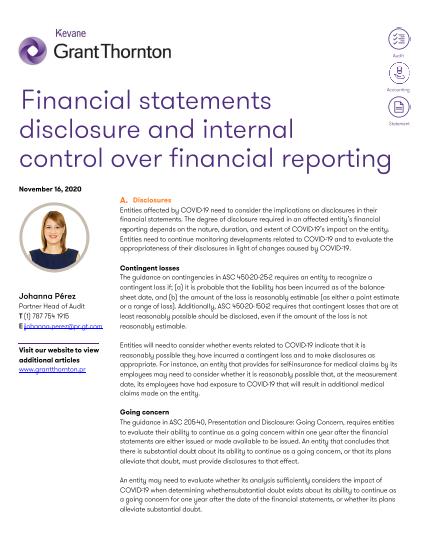A. Disclosures
Entities affected by COVID-19 need to consider the implications on disclosures in their financial statements. The degree of disclosure required in an affected entity’s financial reporting depends on the nature, duration, and extent of COVID-19’s impact on the entity. Entities need to continue monitoring developments related to COVID-19 and to evaluate the appropriateness of their disclosures in light of changes caused by COVID-19.
Contingent losses
The guidance on contingencies in ASC 450-20-25-2 requires an entity to recognize a contingent loss if; (a) it is probable that the liability has been incurred as of the balance-sheet date, and (b) the amount of the loss is reasonably estimable (as either a point estimate or a range of loss). Additionally, ASC 450-20- 50-2 requires that contingent losses that are at least reasonably possible should be disclosed, even if the amount of the loss is not reasonably estimable.
Entities will need to consider whether events related to COVID-19 indicate that it is reasonably possible they have incurred a contingent loss and to make disclosures as appropriate. For instance, an entity that provides for self-insurance for medical claims by its employees may need to consider whether it is reasonably possible that, at the measurement date, its employees have had exposure to COVID-19 that will result in additional medical claims made on the entity.
Going concern
The guidance in ASC 205-40, Presentation and Disclosure: Going Concern, requires entities to evaluate their ability to continue as a going concern within one year after the financial statements are either issued or made available to be issued. An entity that concludes that there is substantial doubt about its ability to continue as a going concern, or that its plans alleviate that doubt, must provide disclosures to that effect.
An entity may need to evaluate whether its analysis sufficiently considers the impact of COVID-19 when determining whether substantial doubt exists about its ability to continue as a going concern for one year after the date of the financial statements, or whether its plans alleviate substantial doubt.
Risks and uncertainties
Under ASC 275, Risks and Uncertainties, entities are required to make qualitative disclosures about risks and uncertainties that could significantly impact the amounts reported in the financial statements in the near term (that is, within one year from the date of the financial statements). Entities may need to evaluate whether it is necessary to include specific disclosures related to risks and uncertainties introduced by COVID-19, including disclosures for significant accounting estimates and vulnerabilities due to concentrations in vendors or customers.
MD&A and risk factors
In addition to disclosures in their financial statements, entities may need to provide additional disclosures about the impact of COVID-19 in their SEC filings under Regulation S-Xin both Management’s Discussion and Analysis (MD&A) and Risk Factors.
MD&A
Entities need to provide clear and understandable discussion of known trends or uncertainties that have or are expected to have a material impact on revenue, income, operations, financial condition, or liquidity in MD&A.
Risk factors
Entities also need to disclose significant risks that may impact their results and the securities they have issued. Entities should consider whether it is necessary to include specific risk factors related to COVID- 19 and their possible impact on their business.
B. Internal control over financial reporting
Entities affected by COVID-19 need to consider its impact on their internal control over financial reporting (ICFR), including whether new controls are necessary or if existing controls have been modified as a result. Situations related to COVID-19 that may impact an entity’s control environment include, but are not limited to, the following:
- absences of personnel that execute controls due to illness, office closings, or mandated work arrangements that prevent them from executing controls as designed
- inadequate information necessary to complete certain controls due to geographical limitations
- changes to existing controls that may create segregation of duties issues
- new controls that may not operate for a sufficient period of time to allow management or the audit team to conclude on their operating effectiveness
New controls or modified controls that are not suitably designed or operating effectively could result in deficiencies in internal controls that are not mitigated by other existing or new controls.
Additionally, COVID-19 may impact management’s ability to complete the financial statement closing process and any associated internal controls in order to prepare the financial statements in a timely fashion. Although many entities may extend their reporting deadlines, these extended timelines could introduce an increased potential for error in the financial statements related to the identification of subsequent events. An entity’s controls over financial reporting also need to include controls over disclosures in the financial statements, including the adequacy of disclosing the effects of COVID-19 and the selection and application of GAAP for accounting for and disclosing matters arising from COVID-19.
For public entities, any changes in internal controls that have materially affected, or are reasonably likely to materially affect, an entity’s ICFR are required to be disclosed in Form 10-Q or Form 10-K of the entity’s quarterly or annual filings, respectively.

